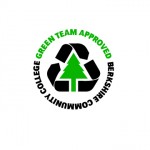This month, the Green Team blog will focus on food waste and easy steps you can take to reduce your own foodprint.
Do you know how much food in the US is never eaten? Do you know how much it costs financially and environmentally? If you don’t, you are not alone. According to a new study from the Johns Hopkins Center for a Livable Future, three-quarters of Americans don’t realize how much food enters the waste stream and believe they waste less food than the national average.
Here are the numbers across the supply chain for the US:
- 40% of food is wasted which is more than 20 pounds of food per person every month
- For a household of four, food waste accounts for $1365-$2275 annual losses
- 10% of the energy budget goes to getting food on our tables
- 50% of land is used for food production
- Rotting food in landfills accounts for 16-25% of methane emissions (methane is a powerful greenhouse gas)
- Since the 1970s, food waste has increased by about 50%
What do these numbers mean? I’ll give it to you straight: Americans are wasting the equivalent of $165 BILLION (yes, DOLLARS!) and 150 TRILLION CALORIES EACH YEAR. With the amount of food wasted in the US each year, 2 billion people could be fed for a year.
Are you surprised by these numbers? Would you like to do something about it? Reducing your foodprint is easy and makes a huge and immediate impact. Here are some quick and easy steps to save money and the environment:
- Shop wisely — meal planning, using shopping lists, and buying only what you’ll need (bulk bins are great for this!)
- Freeze unused ingredients — leftovers and most produce freezes beautifully
- Buy funny fruits and vegetables
- Donate your unwanted or unused non-perishable foods to food pantries in your area
Resources:
You’re Wasting More Food Than You Think; Mother Jones
Wasted Food: U.S. Consumers’ Reported Awareness, Attitudes, and Behaviors; PLOS One
The Environmental Impact of Wasted Food; Fast Company & Inc.
Wasted: How America Is Losing Up to 40 Percent of Its Food from Farm to Fork to Landfill; NRDC Issue Paper
This Year’s 12 Greatest Strides Towards Reducing Food Waste; NRDC
How to Freeze and Store Food; Cook Smarts


